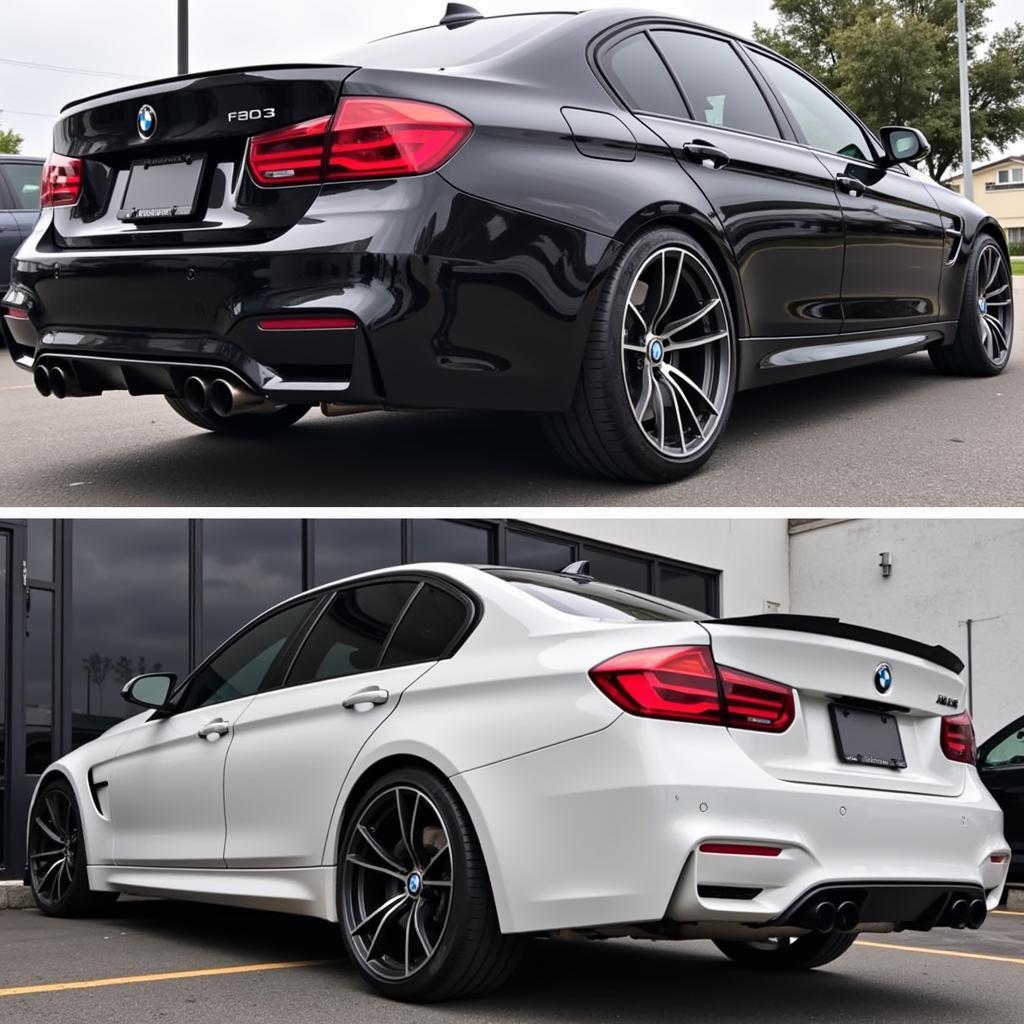The BMW M3 F80 sound is more than just a noise; it’s a symphony of power and performance, a growl that announces the arrival of a true automotive icon. From the throaty rumble at idle to the exhilarating roar at high RPMs, this iconic sound is a key part of the M3 F80 experience. This article will delve into the intricacies of the F80’s exhaust note, exploring the factors that contribute to its unique character and what options are available to personalize it further.
The heart of the BMW M3 F80 sound lies within its twin-turbocharged 3.0-liter inline-six engine. This powerplant is meticulously engineered to deliver not just impressive power but also a captivating auditory experience. But the engine is just the beginning of the story. The exhaust system plays a crucial role in shaping the final sound, carefully tuned to produce a distinct acoustic signature.
Deconstructing the Symphony: The Elements of the BMW M3 F80 Sound
Several factors contribute to the iconic BMW M3 F80 sound. The engine’s architecture, the turbochargers, and the exhaust system all play their part. The inline-six configuration inherently produces a smoother, more refined sound compared to a V6, while the twin turbos add a unique whooshing element to the mix. The exhaust system, with its carefully designed mufflers and resonators, further refines the sound, eliminating unwanted frequencies and amplifying the desirable ones.
The Role of the Exhaust System
The exhaust system is arguably the most significant contributor to the F80’s sonic character. bmw m3 f80 exhaust sound is a frequent search term, highlighting the importance of this component. From the downpipes to the tailpipes, every element is designed to optimize flow and produce a specific sound profile. The stock exhaust system strikes a balance between performance, sound, and regulatory compliance.
“The stock exhaust on the F80 is a good starting point,” says renowned automotive engineer, Dr. Klaus Mueller, “but there’s always room for improvement.”
Tuning the Sound: Aftermarket Options for the BMW M3 F80
For those seeking a more aggressive or personalized sound, a wealth of aftermarket exhaust options is available. bmw m3 turbo sound is a popular search for those who want to enhance the turbocharger’s contribution to the overall sound. These options range from simple muffler deletes to complete cat-back systems, each offering a unique sound signature.
How can I make my BMW M3 F80 sound louder?
Several aftermarket exhaust options can amplify your BMW M3 F80’s sound. Cat-back exhaust systems, muffler deletes, and downpipes can all contribute to a louder and more aggressive exhaust note.
Is the BMW M3 F80 sound artificial?
While some aspects of the BMW M3 F80’s sound are electronically enhanced, the core sound originates from the engine and exhaust system. The Active Sound Design system uses speakers to augment the engine’s natural sound, tailoring it to different driving modes.
 BMW M3 F80 with Aftermarket Exhaust
BMW M3 F80 with Aftermarket Exhaust
“Choosing the right aftermarket exhaust system is crucial,” adds Dr. Mueller. “It’s not just about loudness; it’s about finding a sound that resonates with the driver’s personality and enhances the overall driving experience.” bmw iconic sound sport is a feature that allows drivers to further customize their audio experience.
Why is the BMW M3 F80 sound so important?
The distinctive sound of the BMW M3 F80 contributes significantly to the overall driving experience. It’s an auditory expression of the car’s performance and character, creating a visceral connection between the driver and machine. bmw m3 aftermarket audio can further enhance the in-cabin sound experience.
The BMW M3 F80 sound is a testament to the meticulous engineering and attention to detail that goes into creating a truly iconic performance car. Whether you prefer the refined growl of the stock system or the unleashed roar of an aftermarket upgrade, the F80’s sound is an integral part of its identity.
FAQ
- Can I adjust the BMW M3 F80 sound? Yes, the sound can be adjusted through driving modes and aftermarket exhaust options.
- What makes the BMW M3 F80 sound unique? The combination of the inline-six engine, twin turbos, and carefully tuned exhaust system creates a distinct sonic signature.
- Are there any legal restrictions on modifying the BMW M3 F80 exhaust? Yes, local regulations regarding noise levels and emissions must be adhered to.
- What is Active Sound Design? It’s a system that electronically enhances the engine sound inside the cabin.
- Does changing the exhaust affect performance? Aftermarket exhaust systems can potentially improve performance, but it’s important to choose a reputable brand and have it professionally installed.
- How much does an aftermarket exhaust for the BMW M3 F80 cost? Prices vary depending on the brand and type of system, ranging from a few hundred to several thousand dollars.
- Can I install an aftermarket exhaust myself? While possible, professional installation is recommended to ensure proper fitment and performance.
For further assistance, please contact us via Whatsapp: +1 (641) 206-8880, Email: CARDIAGTECH[email protected] or visit our workshop at 276 Reock St, City of Orange, NJ 07050, United States. Our customer service team is available 24/7.
